 |

|
Funciones para trabajar con "Logistic Regression": Pds::LogisticModel::FittingGradientSVM(), Pds::LogisticModel::Classify(), etc. Más...
Namespaces | |
| namespace | Pds |
| Nombre de espacio para Pds (Procesamiento Digital de Senales) | |
| namespace | Pds::LogisticModel |
| Nombre de espacio para LogisticModel (Logistic regression) | |
Logistic regression : Clasificador | |
| Pds::Vector | Pds::LogisticModel::Classify (const Pds::Vector &W, const Pds::Matrix &X) |
| Calculo del resultado del clasificador. Más... | |
Logistic regression : Función de costo | |
| double | Pds::LogisticModel::CostInformationGain (const Pds::Vector &W, const Pds::Matrix &X, const Pds::Vector &Y) |
| Calculo de costo. Más... | |
| Pds::Vector | Pds::LogisticModel::GradientCostInformationGain (const Pds::Vector &W, const Pds::Matrix &X, const Pds::Vector &Y, double h) |
| Calculo de costo. Más... | |
| double | Pds::LogisticModel::CostCrossEntropy (const Pds::Vector &W, const Pds::Matrix &X, const Pds::Vector &Y) |
| Calculo de pesos. Más... | |
| double | Pds::LogisticModel::CostMeanSquare (const Pds::Vector &W, const Pds::Matrix &X, const Pds::Vector &Y) |
| Calculo de pesos. Más... | |
Logistic regression : Peso inicial | |
| Pds::Vector | Pds::LogisticModel::GetW0MeanMethod (const Pds::Matrix &X) |
| Obtiene de forma rapida un vector | |
| Pds::Vector | Pds::LogisticModel::GetW0CornerMeanMethod (const Pds::Matrix &X, double Delta=0.001) |
| Obtiene de forma rapida un vector | |
| Pds::Vector | Pds::LogisticModel::GetW0MeanSquareMethod (const Pds::Matrix &X) |
| Obtiene de forma rapida un vector | |
Logistic regression : Regresión de pesos : Familia Mean Square | |
| Pds::Vector | Pds::LogisticModel::FittingLogitMeanSquare (Pds::IterationConf &Conf, const Pds::Matrix &X, const Pds::Vector &Y, double Delta=0.0001) |
| Calculo de pesos. Más... | |
| Pds::Vector | Pds::LogisticModel::FittingLogitMeanSquare (const Pds::Matrix &X, const Pds::Vector &Y, double Delta=0.0001) |
| Calculo de pesos. Más... | |
| Pds::Vector | Pds::LogisticModel::FittingLogitWeightedMeanSquare (Pds::IterationConf &Conf, const Pds::Matrix &X, const Pds::Vector &Y, const Pds::Vector &D, double Delta=0.0001) |
| Calculo de pesos. Más... | |
| Pds::Vector | Pds::LogisticModel::FittingLogitWeightedMeanSquare (const Pds::Matrix &X, const Pds::Vector &Y, const Pds::Vector &D, double Delta=0.0001) |
| Calculo de pesos. Más... | |
Logistic regression : Regresión de pesos : Familia Robust Mean Square | |
| Pds::Vector | Pds::LogisticModel::FittingRobustLogitMeanSquare (const Pds::Matrix &X, const Pds::Vector &Y, double Delta=0.0001, unsigned int N=2, double Offset=0.1) |
| Calculo de pesos. Más... | |
| Pds::Vector | Pds::LogisticModel::FittingRobustLogitMeanSquare (Pds::IterationConf &Conf, const Pds::Matrix &X, const Pds::Vector &Y, double Delta=0.0001, unsigned int N=2, double Offset=0.1) |
| Calculo de pesos. Más... | |
Logistic regression : Regresión de pesos : Familia Cross Entropy | |
| Pds::Vector | Pds::LogisticModel::FittingGradientCrossEntropy (Pds::IterationConf &Conf, const Pds::Matrix &X, const Pds::Vector &Y, const Pds::Vector &W0) |
| Gradiente descendente para sigmoide. Más... | |
| Pds::Vector | Pds::LogisticModel::FittingGradientSVM (Pds::IterationConf &Conf, const Pds::Matrix &X, const Pds::Vector &Y, const Pds::Vector &W0) |
| Gradiente descendente para sigmoide. Más... | |
Logistic regression : Regresión de pesos : Familia Information Gain | |
| Pds::Vector | Pds::LogisticModel::FittingOrtogonalIG (const Pds::Matrix &X, const Pds::Vector &Y, unsigned int MinID) |
| Calculo de pesos. Más... | |
| Pds::Vector | Pds::LogisticModel::FittingGradientIG (Pds::IterationConf &Conf, const Pds::Matrix &X, const Pds::Vector &Y, const Pds::Vector &W0) |
| Calculo de pesos. Más... | |
| Pds::Vector | Pds::LogisticModel::FittingParrallelPlaneIS (const Pds::Matrix &X, const Pds::Vector &Y, const Pds::Vector &W0, double *ISmin=NULL, double Delta=0.001) |
| Calculo de pesos buscando el plano paralelo a W0 que genere la menor suma de informaciones en la particion, es equivalente a buscar la mayor information gain. Más... | |
Logistic regression : Funciones de ajuste | |
| Pds::Vector | Pds::LogisticModel::FittingByFactor (const Pds::Matrix &X, const Pds::Vector &Y, const Pds::Vector &W0, double Delta=0.001) |
| Aplica la teoria de Logit MeanSquare para ajustar W0 por um factor real adecuado. Más... | |
Logistic regression : Funciones de diagnóstico | |
| Pds::DataErrorCurve | Pds::LogisticModel::LearningCurves (Pds::IterationConf &Conf, const Pds::Matrix &Xtr, const Pds::Vector &Ytr, const Pds::Matrix &Xcv, const Pds::Vector &Ycv, double percent) |
| Retorna learning curve. Más... | |
Funciones para trabajar con "Logistic Regression": Pds::LogisticModel::FittingGradientSVM(), Pds::LogisticModel::Classify(), etc.
| Pds::Vector Pds::LogisticModel::Classify | ( | const Pds::Vector & | W, |
| const Pds::Matrix & | X | ||
| ) |
Calculo del resultado del clasificador.
![\[ \mathbf{X}= \left( \begin{matrix} \mathbf{x}_1^{T}\\ \mathbf{x}_2^{T}\\ \vdots\\ \mathbf{x}_L^{T}\\ \end{matrix} \right), \qquad h_{\mathbf{w}}\left(\mathbf{X}\right)=Sigmoid([1~\mathbf{X}]\mathbf{w}) \]](form_83.png)
| [in] | W | Vector de pesos. |
| [in] | X | Matriz con los vectores de datos (muestras) en las lineas. |
Referenciado por Pds::LogisticModel::CostInformationGainSoft() y Pds::LogisticModel::CostXqEntropy().
| double Pds::LogisticModel::CostInformationGain | ( | const Pds::Vector & | W, |
| const Pds::Matrix & | X, | ||
| const Pds::Vector & | Y | ||
| ) |
Calculo de costo.
![\[ \mathbf{X}= \left( \begin{matrix} \mathbf{x}_1^{T}\\ \mathbf{x}_2^{T}\\ \vdots\\ \mathbf{x}_L^{T}\\ \end{matrix} \right), \qquad \mathbf{y} =\left(\begin{matrix} y_1\\ y_2\\ \vdots\\ y_L\\ \end{matrix}\right) \qquad \rightarrow \qquad \mathbf{u} =\left(\begin{matrix} 1\\ 1\\ \vdots\\ 1\\ \end{matrix}\right) \]](form_84.png)
![]()
Calculado desde el punto de vista matemático
![]()
![\[ Cost\left(\mathbf{w}\right) \quad = \quad h_b \left(\frac{N_t}{L}\right) -\frac{N_a\left(\mathbf{w}\right)}{L}~h_b \left(\frac{N_1\left(\mathbf{w}\right)}{N_a\left(\mathbf{w}\right)}\right) -\frac{L-N_a\left(\mathbf{w}\right)}{L}~h_b \left(\frac{N_t-N_1\left(\mathbf{w}\right)}{L-N_a\left(\mathbf{w}\right)}\right) \]](form_87.png)
Calculado desde el punto de vista programático
![\[ \mathbf{\hat{y}} =\left(\begin{matrix} \mathbf{y}_{0}\\ \mathbf{y}_{1} \end{matrix}\right), \quad \mathbf{y}_{0}=\mathbf{y}_{\mathbf{\bar{z}}\equiv \bar{0}}, \quad \mathbf{y}_{1}=\mathbf{y}_{\mathbf{\bar{z}}\equiv \bar{1}} \]](form_88.png)
![\[ Cost\left(\mathbf{w}\right) \quad = \quad h_b \left(p_{\mathbf{\hat{y}}}\right) -\frac{N_{\mathbf{y}_{1}}}{L}~h_b \left(p_{\mathbf{y}_1}\right) -\frac{N_{\mathbf{y}_{0}}}{L}~h_b \left(p_{\mathbf{y}_0}\right) \]](form_89.png)
![]() es la probabilidad de 1s en el vector
es la probabilidad de 1s en el vector ![]()
![]() es el número de elementos en el vector
es el número de elementos en el vector ![]()
![]() es la probabilidad de 1s en el vector
es la probabilidad de 1s en el vector ![]()
![]() es el número de elementos en el vector
es el número de elementos en el vector ![]()
| [in] | W | Vector de pesos. |
| [in] | X | Matriz con los vectores de datos (muestras) en las lineas. |
| [in] | Y | Vector de datos de salida. |
Referenciado por Pds::LogisticModel::FittingGradientIGSoft() y Pds::LogisticModel::GradientCostInformationGainSoft2().
| Pds::Vector Pds::LogisticModel::GradientCostInformationGain | ( | const Pds::Vector & | W, |
| const Pds::Matrix & | X, | ||
| const Pds::Vector & | Y, | ||
| double | h | ||
| ) |
Calculo de costo.
![\[ \mathbf{X}= \left( \begin{matrix} \mathbf{x}_1^{T}\\ \mathbf{x}_2^{T}\\ \vdots\\ \mathbf{x}_L^{T}\\ \end{matrix} \right), \qquad \mathbf{y} =\left(\begin{matrix} y_1\\ y_2\\ \vdots\\ y_L\\ \end{matrix}\right), \qquad \mathbf{w} =\left(\begin{matrix} w_0\\ w_1\\ \vdots\\ w_N\\ \end{matrix}\right) \]](form_96.png)
![]()
![]()
![\[ \nabla C(\mathbf{w}) \equiv \frac{\partial C(\mathbf{w})}{\partial \mathbf{w}} \equiv \left(\begin{matrix} \frac{\partial C(\mathbf{w})}{\partial w_0}\\ \frac{\partial C(\mathbf{w})}{\partial w_1}\\ \vdots\\ \frac{\partial C(\mathbf{w})}{\partial w_N}\\ \end{matrix}\right) \approx \left(\begin{matrix} \frac{ C(\mathbf{w}+\mathbf{h}_0) - C(\mathbf{w}-\mathbf{h}_0)}{2h}\\ \frac{ C(\mathbf{w}+\mathbf{h}_1) - C(\mathbf{w}-\mathbf{h}_1)}{2h}\\ \vdots\\ \frac{ C(\mathbf{w}+\mathbf{h}_N) - C(\mathbf{w}-\mathbf{h}_N)}{2h}\\ \end{matrix}\right) \]](form_99.png)
| [in] | W | Vector de pesos. |
| [in] | X | Matriz con los vectores de datos (muestras) en las lineas. |
| [in] | Y | Vector de datos de salida. |
| [in] | h | Paso para aplicar la. |
| double Pds::LogisticModel::CostCrossEntropy | ( | const Pds::Vector & | W, |
| const Pds::Matrix & | X, | ||
| const Pds::Vector & | Y | ||
| ) |
Calculo de pesos.
![\[ \mathbf{X}= \left( \begin{matrix} \mathbf{x}_1^{T}\\ \mathbf{x}_2^{T}\\ \vdots\\ \mathbf{x}_L^{T}\\ \end{matrix} \right), \qquad \mathbf{y} =\left(\begin{matrix} y_1\\ y_2\\ \vdots\\ y_L\\ \end{matrix}\right), \qquad \rightarrow \qquad h_{\mathbf{w}}\left(\mathbf{x}^{T}\right)=Sigmoid\left(\left[\overline{1}~\mathbf{X}\right]\mathbf{w}\right) \]](form_100.png)
![\[ Cost\left(\mathbf{w}\right) \quad = \quad \frac{1}{L}\sum \limits_{i}^{L} -y_{i}~log_2\left(h_{\mathbf{w}}\left(\mathbf{x}_{i}^{T}\right)\right) - \left(1-y_{i}\right)~log_2\left(1-h_{\mathbf{w}}\left(\mathbf{x}_{i}^{T}\right)\right) \]](form_101.png)
| [in] | W | Vector de pesos. |
| [in] | X | Matriz con los vectores de datos (muestras) en las lineas. |
| [in] | Y | Vector de datos de salida. |
| double Pds::LogisticModel::CostMeanSquare | ( | const Pds::Vector & | W, |
| const Pds::Matrix & | X, | ||
| const Pds::Vector & | Y | ||
| ) |
Calculo de pesos.
![\[ \mathbf{X}= \left( \begin{matrix} \mathbf{x}_1^{T}\\ \mathbf{x}_2^{T}\\ \vdots\\ \mathbf{x}_L^{T}\\ \end{matrix} \right), \qquad \mathbf{y} =\left(\begin{matrix} y_1\\ y_2\\ \vdots\\ y_L\\ \end{matrix}\right), \qquad \rightarrow \qquad h_{\mathbf{w}}\left(\mathbf{X}\right)=Sigmoid\left(\left[\overline{1}~\mathbf{X}\right]\mathbf{w}\right) \]](form_102.png)
![\[ Cost\left(\mathbf{w}\right) = \frac{1}{L}||h_{\mathbf{w}}\left(\mathbf{X}\right)-\mathbf{y}||^2 = \frac{1}{L}\sum \limits_{i}^{L} \left(h_{\mathbf{w}}\left(\mathbf{x}_i^{T}\right)-y_i\right)^2 \]](form_103.png)
| [in] | W | Vector de pesos. |
| [in] | X | Matriz con los vectores de datos (muestras) en las lineas. |
| [in] | Y | Vector de datos de salida. |
| Pds::Vector Pds::LogisticModel::GetW0MeanMethod | ( | const Pds::Matrix & | X | ) |
Obtiene de forma rapida un vector ![]() inicial para usar en regresion logistica.
inicial para usar en regresion logistica.
Coloca el hiperplano en el punto medio de las muestras, dejando aleatoriamente selecionada la direción del hiperplano.
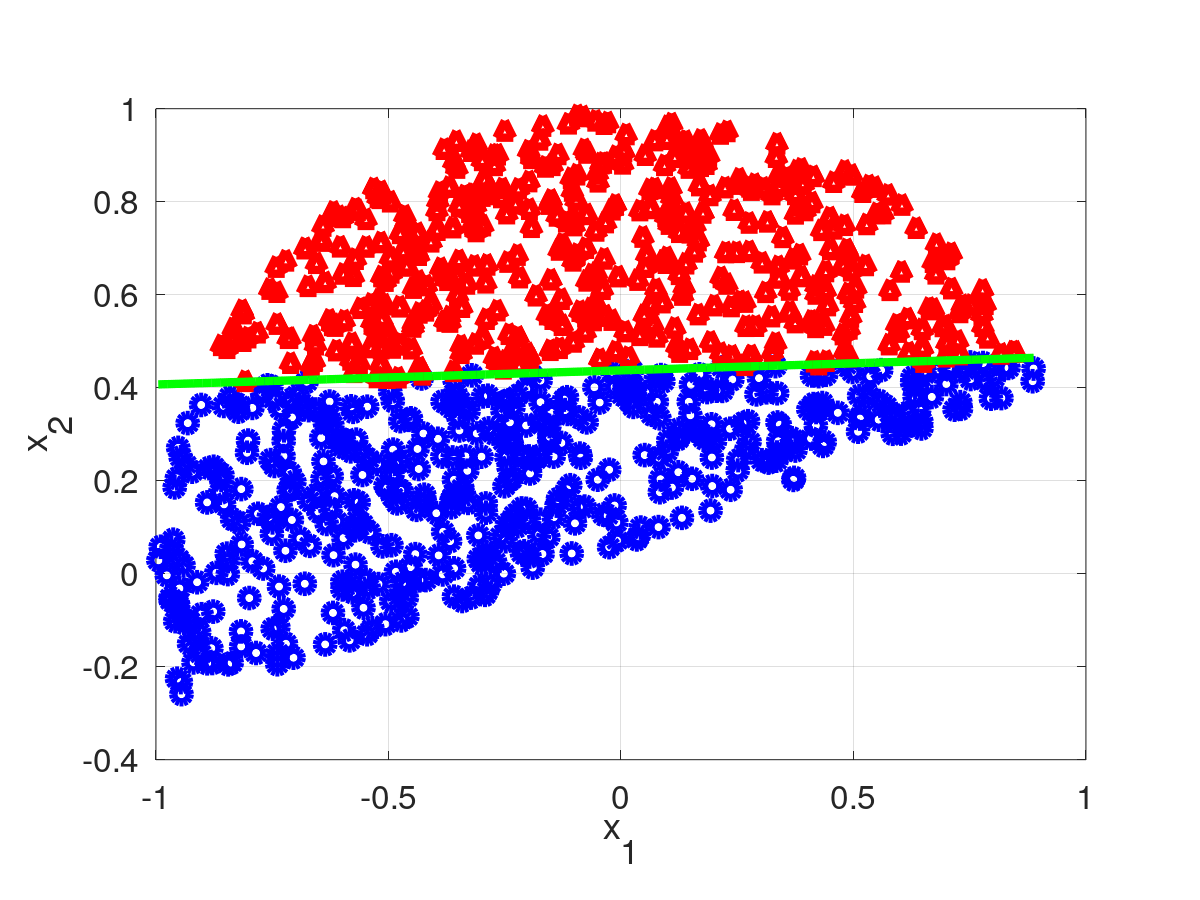
![]()
![]()
![]()
![\[w_1=randn();~w_2=randn();~...;~w_N=randn();\qquad w_{0}=-\sum_{n=1}^{N} z_{i} w_{i}\]](form_108.png)
![\[\mathbf{w}\leftarrow\frac{\mathbf{w}}{|\mathbf{w}|}\]](form_109.png)
| [in] | X | Vector de datos |
| Pds::Vector Pds::LogisticModel::GetW0CornerMeanMethod | ( | const Pds::Matrix & | X, |
| double | Delta = 0.001 |
||
| ) |
Obtiene de forma rapida un vector ![]() inicial para usar en regresion logistica.
inicial para usar en regresion logistica.
Coloca la linea de modo que todos los puntos son positivos (1).
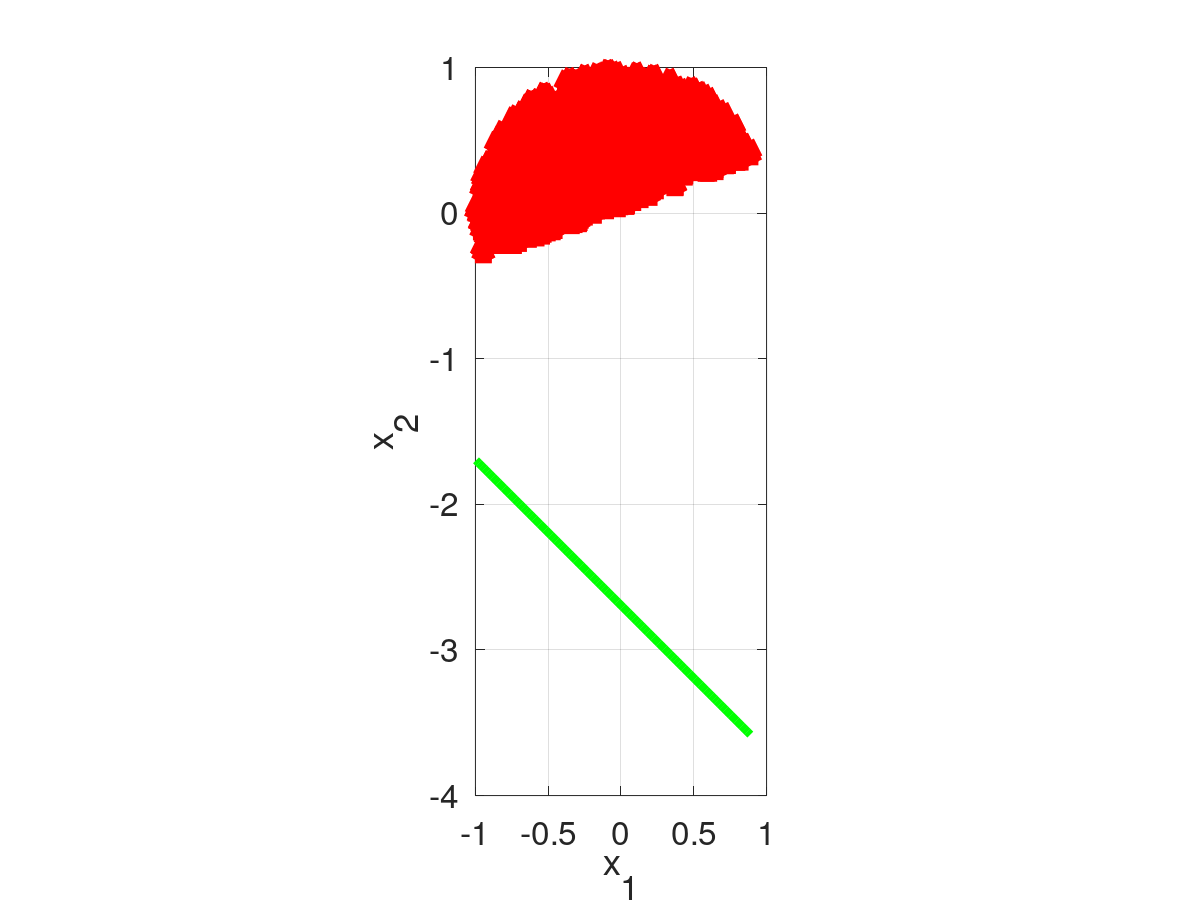
![]()
![]()
![\[w_{0}=-\sum_{n=1}^{N} z_{i},\qquad w_1=w_2=...w_N=1\]](form_110.png)
| [in] | X | Vector de datos |
| [in] | Delta | Factor de ajuste final. |
Referenciado por Pds::LogisticModel::FittingGradientIGSoft().
| Pds::Vector Pds::LogisticModel::GetW0MeanSquareMethod | ( | const Pds::Matrix & | X | ) |
Obtiene de forma rapida un vector ![]() inicial para usar en regresion logistica.
inicial para usar en regresion logistica.
Encaja un plano dentro de la nuve de puntos, bajo la perspectiva de que $x_1$ es el contradominio del dominio ![]() .
.
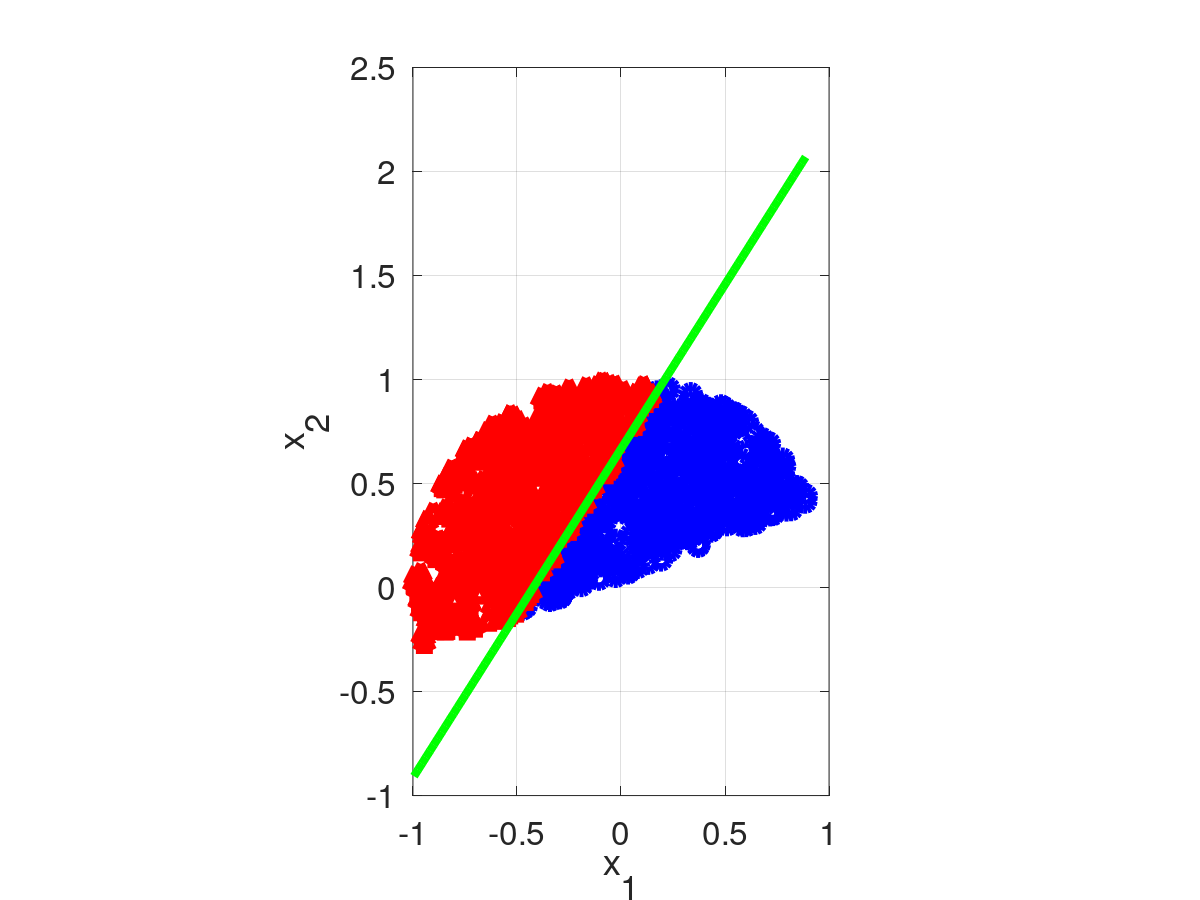
![]()
![]()
![]()
![]()
![]()
| [in] | X | Vector de datos |
| Pds::Vector Pds::LogisticModel::FittingLogitMeanSquare | ( | Pds::IterationConf & | Conf, |
| const Pds::Matrix & | X, | ||
| const Pds::Vector & | Y, | ||
| double | Delta = 0.0001 |
||
| ) |
Calculo de pesos.
![\[ \mathbf{X}= \left( \begin{matrix} \mathbf{x}_1^{T}\\ \mathbf{x}_2^{T}\\ \vdots\\ \mathbf{x}_L^{T}\\ \end{matrix} \right), \qquad \mathbf{y} =\left(\begin{matrix} y_1\\ y_2\\ \vdots\\ y_L\\ \end{matrix}\right), \qquad \rightarrow \qquad \mathbf{R} = \left(\begin{matrix} 1 & \mathbf{X}\\ \end{matrix}\right), \qquad \mathbf{y_o} = \delta+(1-2 \delta)\mathbf{y}. \]](form_117.png)
![\[ \begin{array}{l} if(rcond>=Pds::Ml::WarningRCond) \\ \qquad \mathbf{w} = \left(\mathbf{R}^{T}\mathbf{R}\right)^{-1} \mathbf{R}^{T} logit(\mathbf{y_o})\\ \qquad with \qquad Cost(\mathbf{w}) \equiv \frac{1}{L}||\mathbf{R}\mathbf{w}-logit(\mathbf{y_o})||^2 \\ else\\ \qquad \mathbf{w} \leftarrow \mathbf{w} +\left(\mathbf{R}^{T}\mathbf{R}+\frac{\gamma L}{N}\mathbf{I}\right)^{-1} \left(\mathbf{R}^{T} logit(\mathbf{y_o})-\mathbf{R}^{T}\mathbf{R} \mathbf{w} \right)\\ \qquad with \qquad Cost(\mathbf{w}) \equiv \frac{1}{L}||\mathbf{R}\mathbf{w}-logit(\mathbf{y_o})||^2+\frac{\gamma}{N}||\mathbf{w}-\mathbf{w}_{last}||^2 \end{array} \]](form_118.png)
| [in] | Conf | Configuraciones para algun algoritmo que itera. |
| [in] | X | Vector de datos |
| [in] | Y | Vector de datos |
| [in] | Delta | Valor |
| Pds::Vector Pds::LogisticModel::FittingLogitMeanSquare | ( | const Pds::Matrix & | X, |
| const Pds::Vector & | Y, | ||
| double | Delta = 0.0001 |
||
| ) |
Calculo de pesos.
![\[ \mathbf{X}= \left( \begin{matrix} \mathbf{x}_1^{T}\\ \mathbf{x}_2^{T}\\ \vdots\\ \mathbf{x}_L^{T}\\ \end{matrix} \right), \qquad \mathbf{y} = \left(\begin{matrix} y_1\\ y_2\\ \vdots\\ y_L\\ \end{matrix}\right), \]](form_121.png)
![]()
![\[ \begin{array}{l} if(rcond>=Pds::Ml::WarningRCond) \\ \qquad \mathbf{w} = \left(\mathbf{R}^{T}\mathbf{R}\right)^{-1} \mathbf{R}^{T} logit(\mathbf{y_o}) \\ else\\ \qquad \mathbf{w} = [] \end{array} \]](form_123.png)
| [in] | X | Vector de datos |
| [in] | Y | Vector de datos |
| [in] | Delta | Valor |
| Pds::Vector Pds::LogisticModel::FittingLogitWeightedMeanSquare | ( | Pds::IterationConf & | Conf, |
| const Pds::Matrix & | X, | ||
| const Pds::Vector & | Y, | ||
| const Pds::Vector & | D, | ||
| double | Delta = 0.0001 |
||
| ) |
Calculo de pesos.
![\[ \mathbf{X}= \left( \begin{matrix} \mathbf{x}_1^{T}\\ \mathbf{x}_2^{T}\\ \vdots\\ \mathbf{x}_L^{T}\\ \end{matrix} \right), \qquad \mathbf{y} =\left(\begin{matrix} y_1\\ y_2\\ \vdots\\ y_L\\ \end{matrix}\right), \qquad \rightarrow \qquad \mathbf{R} = \left(\begin{matrix} 1 & \mathbf{X}\\ \end{matrix}\right), \qquad \mathbf{y_o} = \delta+(1-2 \delta)\mathbf{y}. \]](form_117.png)
![]()
![\[ \begin{array}{l} if(rcond>=Pds::Ml::WarningRCond) \\ \qquad \mathbf{w} = \left(\mathbf{R}^{T} \mathbf{A} \mathbf{R}\right)^{-1} \mathbf{R}^{T} \mathbf{A} logit(\mathbf{y_o})\\ \qquad with \qquad Cost(\mathbf{w}) \equiv \frac{1}{L}||\mathbf{R}\mathbf{w}-logit(\mathbf{y_o})||^2_{\mathbf{A}} \\ else\\ \qquad \mathbf{w} \leftarrow \mathbf{w} +\left(\mathbf{R}^{T} \mathbf{A} \mathbf{R}+\frac{\gamma L}{N}\mathbf{I}\right)^{-1} \left(\mathbf{R}^{T} \mathbf{A} logit(\mathbf{y_o})-\mathbf{R}^{T}\mathbf{R} \mathbf{w} \right)\\ \qquad with \qquad Cost(\mathbf{w}) \equiv \frac{1}{L}||\mathbf{R}\mathbf{w}-logit(\mathbf{y_o})||^2_{\mathbf{A}}+\frac{\gamma}{N}||\mathbf{w}-\mathbf{w}_{last}||^2 \end{array} \]](form_125.png)
| [in] | Conf | Configuraciones para algun algoritmo que itera. |
| [in] | X | Vector de datos |
| [in] | Y | Vector de datos |
| [in] | D | Vector |
| [in] | Delta | Valor |
| Pds::Vector Pds::LogisticModel::FittingLogitWeightedMeanSquare | ( | const Pds::Matrix & | X, |
| const Pds::Vector & | Y, | ||
| const Pds::Vector & | D, | ||
| double | Delta = 0.0001 |
||
| ) |
Calculo de pesos.
![\[ \mathbf{X}= \left( \begin{matrix} \mathbf{x}_1^{T}\\ \mathbf{x}_2^{T}\\ \vdots\\ \mathbf{x}_L^{T}\\ \end{matrix} \right), \qquad \mathbf{y} = \left(\begin{matrix} y_1\\ y_2\\ \vdots\\ y_L\\ \end{matrix}\right), \qquad \mathbf{A}=diag(\mathbf{d})^T diag(\mathbf{d}) \]](form_128.png)
![]()
![]()
![\[ \begin{array}{l} if(rcond>=Pds::Ml::WarningRCond) \\ \qquad \mathbf{w} = \left(\mathbf{R}^{T}\mathbf{A}\mathbf{R}\right)^{-1} \mathbf{R}^{T} \mathbf{A} logit(\mathbf{y_o}) \\ else\\ \qquad \mathbf{w} = [] \end{array} \]](form_130.png)
| [in] | X | Vector de datos |
| [in] | Y | Vector de datos |
| [in] | D | Vector |
| [in] | Delta | Valor |
| Pds::Vector Pds::LogisticModel::FittingRobustLogitMeanSquare | ( | const Pds::Matrix & | X, |
| const Pds::Vector & | Y, | ||
| double | Delta = 0.0001, |
||
| unsigned int | N = 2, |
||
| double | Offset = 0.1 |
||
| ) |
Calculo de pesos.
![\[ \begin{array}{l} W=Pds::LogisticModel::FittingLogitMeanSquare(X,Y,Delta);\\ for(n=0;n<N;n++)\\ \{\\ \qquad Yr=Pds::LogisticModel::Classify(W,X);\\ \qquad D=\frac{1}{|Y-hard\{Yr\}|+Offset}\\ \qquad W=Pds::LogisticModel::FittingLogitWeightedMeanSquare(X,Y,D,Delta);\\ \} \end{array} \]](form_131.png)
| [in] | X | Vector de datos |
| [in] | Y | Vector de datos |
| [in] | Delta | Valor |
| [in] | N | Pasadas de weighted mean square method. N==0 desactiva la etapa robusta. |
| [in] | Offset | Offset en los pesos. |
| Pds::Vector Pds::LogisticModel::FittingRobustLogitMeanSquare | ( | Pds::IterationConf & | Conf, |
| const Pds::Matrix & | X, | ||
| const Pds::Vector & | Y, | ||
| double | Delta = 0.0001, |
||
| unsigned int | N = 2, |
||
| double | Offset = 0.1 |
||
| ) |
Calculo de pesos.
![\[ \begin{array}{l} W=Pds::LogisticModel::FittingLogitMeanSquare(Conf,X,Y,Delta);\\ for(n=0;n<N;n++)\\ \{\\ \qquad Yr=Pds::LogisticModel::Classify(W,X);\\ \qquad D=\frac{1}{|Y-hard\{Yr\}|+Offset}\\ \qquad W=Pds::LogisticModel::FittingLogitWeightedMeanSquare(Conf,X,Y,D,Delta);\\ \} \end{array} \]](form_132.png)
| [in] | Conf | Configuraciones para algun algoritmo que itera. |
| [in] | X | Vector de datos |
| [in] | Y | Vector de datos |
| [in] | Delta | Valor |
| [in] | N | Pasadas de weighted mean square method. N==0 desactiva la etapa robusta. |
| [in] | Offset | Offset en los pesos. |
| Pds::Vector Pds::LogisticModel::FittingGradientCrossEntropy | ( | Pds::IterationConf & | Conf, |
| const Pds::Matrix & | X, | ||
| const Pds::Vector & | Y, | ||
| const Pds::Vector & | W0 | ||
| ) |
Gradiente descendente para sigmoide.
![\[ \mathbf{X}= \left( \begin{matrix} \mathbf{x}_1^{T}\\ \mathbf{x}_2^{T}\\ \vdots\\ \mathbf{x}_L^{T}\\ \end{matrix} \right), \qquad \mathbf{y} = \left(\begin{matrix} y_1\\ y_2\\ \vdots\\ y_L\\ \end{matrix}\right), \]](form_121.png)
![\[ \mathbf{R} = [\mathbf{1}\quad \mathbf{X}], \qquad h_{\mathbf{w}}(\mathbf{X}) \leftarrow Sigmoid(\mathbf{R} \mathbf{w}), \qquad \mathbf{I}_b= \left(\begin{matrix} 0 & 0 & 0 & ... & 0\\ 0 & 1 & 0 & ... & 0\\ 0 & 0 & 1 & ... & 0\\ \vdots & \vdots & \vdots & \vdots & \vdots \\ 0 & 0 & 0 & ... & 1 \end{matrix}\right) \]](form_133.png)
![\[ Cost\left(\mathbf{w}\right) = \frac{1}{L}\sum \limits_{i}^{L} \left\{ -y_{i} ~ log_2\left(h_{\mathbf{w}}\left(\mathbf{x}_{i}^{T}\right)\right) ~ - \left(1-y_{i}\right) ~ log_2\left(1-h_{\mathbf{w}}\left(\mathbf{x}_{i}^{T}\right)\right) \right\} \qquad +\qquad \frac{\lambda}{2N}||\mathbf{I}_b\mathbf{w}||^2 \]](form_134.png)
![\[ Repetir: \qquad \mathbf{w} \leftarrow \mathbf{w} - \alpha \left\{ \frac{1}{L} \mathbf{R}^{T} \left( h_{\mathbf{w}}(\mathbf{X})-\mathbf{y} \right) \quad + \quad \frac{\lambda}{N} \mathbf{I}_b\mathbf{w} \right\}. \]](form_135.png)
| [in] | Conf | Valores de configuracion de la iteracion. |
| [in] | X | Matriz con los vectores de datos (muestras) en las lineas. |
| [in] | Y | Vector resultados |
| [in] | W0 | Primeiro valor de |
| Pds::Vector Pds::LogisticModel::FittingGradientSVM | ( | Pds::IterationConf & | Conf, |
| const Pds::Matrix & | X, | ||
| const Pds::Vector & | Y, | ||
| const Pds::Vector & | W0 | ||
| ) |
Gradiente descendente para sigmoide.
![\[ \mathbf{X}= \left( \begin{matrix} \mathbf{x}_1^{T}\\ \mathbf{x}_2^{T}\\ \vdots\\ \mathbf{x}_L^{T}\\ \end{matrix} \right), \qquad \mathbf{y} = \left(\begin{matrix} y_1\\ y_2\\ \vdots\\ y_L\\ \end{matrix}\right), \]](form_121.png)
![\[ \mathbf{\hat{y}}=2\mathbf{y}-1, \qquad \mathbf{R} = [\mathbf{1}\quad \mathbf{X}], \qquad \mathbf{r}^{T} = [\mathbf{1}\quad \mathbf{x}^{T}], \qquad \mathbf{I}_b= \left(\begin{matrix} 0 & 0 & 0 & ... & 0\\ 0 & 1 & 0 & ... & 0\\ 0 & 0 & 1 & ... & 0\\ \vdots & \vdots & \vdots & \vdots & \vdots \\ 0 & 0 & 0 & ... & 1 \end{matrix}\right) \]](form_136.png)
![\[ \begin{matrix} Cost\left(\mathbf{w}\right) & = & \frac{1}{L}\sum \limits_{i}^{L} \left\{ y_{i} ~ Cost_{1}\left(\mathbf{r}^{T}\mathbf{w}\right) ~ + \left(1-y_{i}\right) ~ Cost_{0}\left(\mathbf{r}^{T}\mathbf{w}\right) \right\} & + & \frac{\lambda}{2N}||\mathbf{I}_b\mathbf{w}||^2\\ ~ & = & \frac{1}{L}\sum \limits_{i}^{L} Max\{0,1-\hat{y}_{i}\mathbf{r}^{T}\mathbf{w}\} & + & \frac{\lambda}{2N}||\mathbf{I}_b\mathbf{w}||^2\\ \end{matrix} \]](form_137.png)
![\[ -log\left(\frac{1}{1+e^{-z}}\right) \approx Cost_{1}\left(z\right)=Cost_{0}\left(-z\right) = (1-z)(0\leq (1-z)) \]](form_138.png)
![\[ \frac{\partial Max\{0,1-(2 y-1) z \} }{\partial z} \equiv \phi_{y}(z)= \left\{ \begin{matrix} -y & ; & z<-1\\ 1-2y & ; & -1 \leq z \leq +1\\ 1-y & ; & +1 \leq z \end{matrix} \right. \]](form_139.png)
![\[ Repetir: \qquad \mathbf{w} \leftarrow \mathbf{w} - \alpha \left\{ \frac{1}{L} \mathbf{R}^{T} \phi_{\mathbf{y}}(\mathbf{R}\mathbf{w}) \quad + \quad \frac{\lambda}{N} \mathbf{I}_b\mathbf{w} \right\}. \]](form_140.png)
| [in] | Conf | Valores de configuracion de la iteracion. |
| [in] | X | Matriz con los vectores de datos (muestras) en las lineas. |
| [in] | Y | Vector resultados |
| [in] | W0 | Primeiro valor de |
| Pds::Vector Pds::LogisticModel::FittingOrtogonalIG | ( | const Pds::Matrix & | X, |
| const Pds::Vector & | Y, | ||
| unsigned int | MinID | ||
| ) |
Calculo de pesos.
![\[ \mathbf{X}= \left( \begin{matrix} \mathbf{x}_1^{T}\\ \mathbf{x}_2^{T}\\ \vdots\\ \mathbf{x}_L^{T}\\ \end{matrix} \right)\equiv \left( \begin{matrix} \mathbf{v}_1& \mathbf{v}_2& \hdots& \mathbf{v}_N& \end{matrix} \right), \qquad \mathbf{y} = \left(\begin{matrix} y_1\\ y_2\\ \vdots\\ y_L\\ \end{matrix}\right), \]](form_141.png)
![\[ \begin{array}{l} for(n=0;n<N;n++)\\ \{\\ \qquad \mathbf{y_s} \leftarrow \mathbf{y}\\ \qquad Sort~ascending~\mathbf{v}_n~and~rearrange~\mathbf{y_s};\\ \qquad \{ID_{n},IG_{n},Sign_{n}\}\leftarrow GetBestInformationGainID(\mathbf{y_s},0.5,MinID);\\ \qquad umbral_{n}\leftarrow \mathbf{v}_n[ID_{n}]\\ \}\\ ~\\ n_{opt}\leftarrow arg_n max~IG_{n}\\ ~\\ if(Sign_{n_{opt}}==0)\\ \qquad w_0 \leftarrow \mathbf{v}_{n_{opt}}[ID_{n_{opt}}] \\ \qquad w_{n_{opt}} \leftarrow -1 \\ else\\ \qquad w_0 \leftarrow -\mathbf{v}_{n_{opt}}[ID_{n_{opt}}] \\ \qquad w_{n_{opt}} \leftarrow 1 \\ ~\\ \mathbf{w} \leftarrow (w_0,~w_1,~w_2,~...,w_N); \\ return ~\mathbf{w}; \end{array} \]](form_142.png)
| [in] | X | Vector de datos |
| [in] | Y | Vector de datos |
| [in] | MinID | Cantidad minima de muestras en cada grupo separado. if(Y.Nel()<(2*MinID)) return Pds::Vector(); |
| Pds::Vector Pds::LogisticModel::FittingGradientIG | ( | Pds::IterationConf & | Conf, |
| const Pds::Matrix & | X, | ||
| const Pds::Vector & | Y, | ||
| const Pds::Vector & | W0 | ||
| ) |
Calculo de pesos.
![\[ \mathbf{X}= \left( \begin{matrix} \mathbf{x}_1^{T}\\ \mathbf{x}_2^{T}\\ \vdots\\ \mathbf{x}_L^{T}\\ \end{matrix} \right), \qquad \mathbf{y} =\left(\begin{matrix} y_1\\ y_2\\ \vdots\\ y_L\\ \end{matrix}\right), \qquad \mathbf{w} =\left(\begin{matrix} w_0\\ w_1\\ \vdots\\ w_N\\ \end{matrix}\right) \]](form_96.png)
![]()
![\[ \frac{\partial C(\mathbf{w})}{\partial \mathbf{w}} \equiv Pds::LogisticModel::GradientCostInformationGain(\mathbf{w},\mathbf{X},\mathbf{y},h) \]](form_143.png)
![\[ E(\mathbf{w})\equiv -C(\mathbf{w}) \qquad \rightarrow \qquad \frac{\partial E(\mathbf{w})}{\partial \mathbf{w}}\equiv -\frac{\partial C(\mathbf{w})}{\partial \mathbf{w}} \]](form_144.png)
![\[ Repetir: \quad \mathbf{w} \leftarrow \mathbf{w} + \alpha \frac{\partial C(\mathbf{w})}{\partial \mathbf{w}} \]](form_145.png)
| [in] | Conf | Objeto de configuracion de iteraciones. |
| [in] | X | Matriz con los vectores de datos (muestras) en las lineas. |
| [in] | Y | Vector de datos de salida. |
| [in] | W0 | Vector inicial de pesos. |
| Pds::Vector Pds::LogisticModel::FittingParrallelPlaneIS | ( | const Pds::Matrix & | X, |
| const Pds::Vector & | Y, | ||
| const Pds::Vector & | W0, | ||
| double * | ISmin = NULL, |
||
| double | Delta = 0.001 |
||
| ) |
Calculo de pesos buscando el plano paralelo a W0 que genere la menor suma de informaciones en la particion, es equivalente a buscar la mayor information gain.
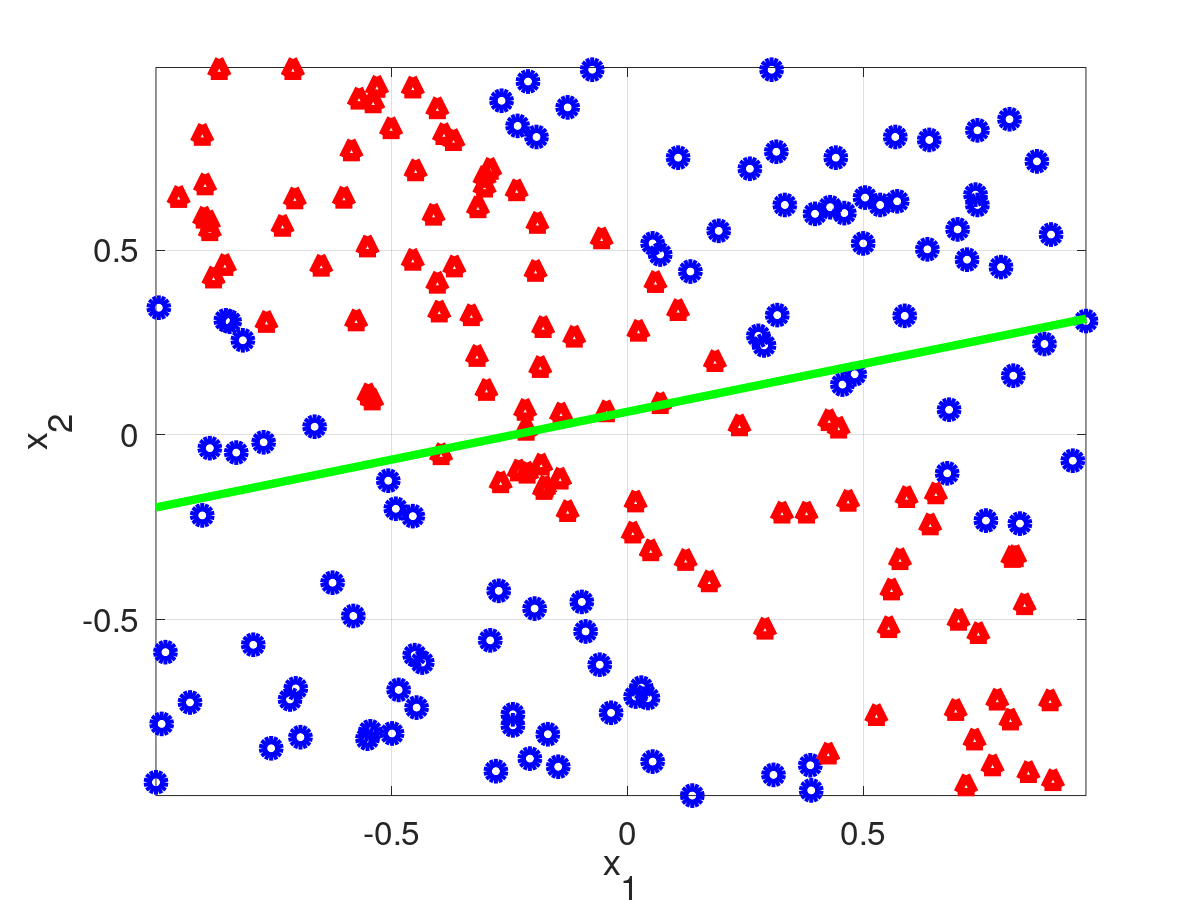
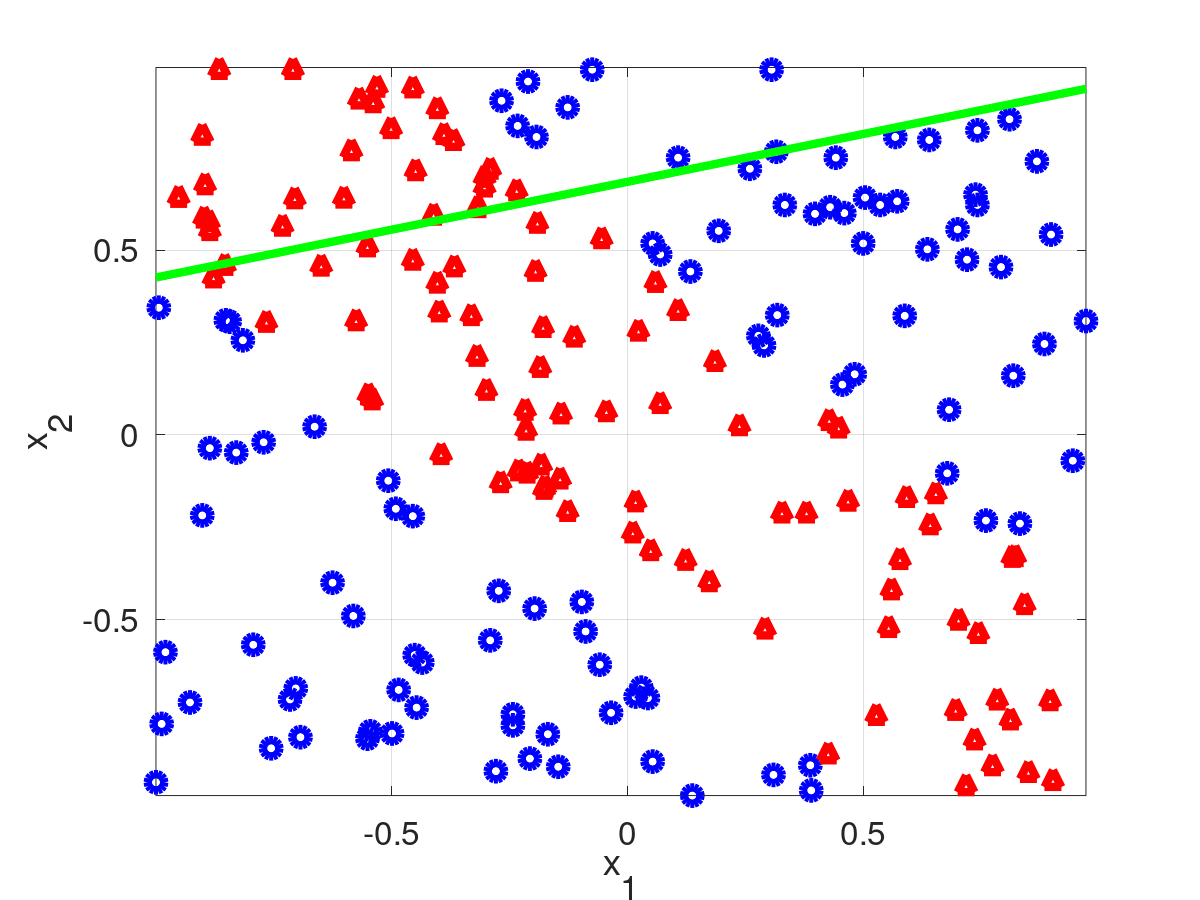
| [in] | X | Matriz con los vectores de datos (muestras) en las lineas. |
| [in] | Y | Vector de datos de salida. |
| [in] | W0 | Vector inicial de pesos. |
| [out] | ISmin | [Optional] Valor de la Information Sum mínima. |
| [in] | Delta | Factor de ajuste. |
| Pds::Vector Pds::LogisticModel::FittingByFactor | ( | const Pds::Matrix & | X, |
| const Pds::Vector & | Y, | ||
| const Pds::Vector & | W0, | ||
| double | Delta = 0.001 |
||
| ) |
Aplica la teoria de Logit MeanSquare para ajustar W0 por um factor real adecuado.
| [in] | X | Matriz con los vectores de datos (muestras) en las lineas. |
| [in] | Y | Vector de datos de salida. |
| [in] | W0 | Vector inicial de pesos. |
| [in] | Delta | Factor de ajuste. |
| Pds::DataErrorCurve Pds::LogisticModel::LearningCurves | ( | Pds::IterationConf & | Conf, |
| const Pds::Matrix & | Xtr, | ||
| const Pds::Vector & | Ytr, | ||
| const Pds::Matrix & | Xcv, | ||
| const Pds::Vector & | Ycv, | ||
| double | percent | ||
| ) |
Retorna learning curve.
![]()
![]()
| [in,out] | Conf | Valores de configuracion de la iteracion. |
| [in] | Xtr | Datos X de entrenamiento. |
| [in] | Ytr | Datos Y de entrenamiento. |
| [in] | Xcv | Datos X de cross-validation. |
| [in] | Ycv | Datos Y de cross-validation. |
| [in] | percent | Porcentaje de datos testados. |
 1.9.2
1.9.2